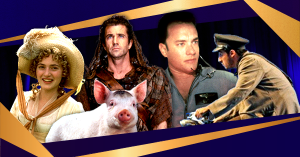The 15 Most Eccentric TV Detectives
In this week's Total Recall, we look at some of the most quirky and unique small-screen sleuths.
It’s hard to stand out on a crowded programming dial, and that’s probably always been especially true for the stars of crime procedurals; often, making one’s mark isn’t as easy as simply lowering one’s shades while Roger Daltrey screams on the soundtrack. In order to rise above the fray, detective shows sometimes resort to adding the odd wrinkle or two in order to get our attention — and although this tactic isn’t always successful, sometimes it really, really works. In honor of all those offbeat gumshoes, this week, we’re devoting Total Recall to an appreciative look back at some of the quirkiest crime-solvers in TV history. Join us, won’t you?
Andy Barker – Andy Barker P.I.
Here’s TV’s biggest detective quirk: It’s a hard, dangerous occupation, dominated by grueling hours in which nothing seems to happen, but showrunners seem to think it’s the type of career that any old fool can bumble their way into without getting his or her head blown off. Not that we’re complaining, mind you — especially when the results are as gleefully absurd as Andy Barker, P.I., the lamentably short-lived comedy starring Andy Richter as a mild-mannered accountant who finds himself dragged into a life of crimefighting after renting some new office space in the spot where a since-retired private dick once plied his trade. Only six episodes were made, but with a supporting cast that included Arrested Development‘s Tony Hale, a roster of guest stars that made room for Ed Asner, and Richter playing a sweet-tempered naïf as only he can, Barker could have — and should have — run for far longer.
Barnaby and Betty Jones – Barnaby Jones
Although Betty (Lee Meriweather) was the quirkier of the two Joneses, having backed into the family P.I. business after her brother was murdered, her dad Barnaby (Buddy Ebsen) was no stranger to quirk himself — he was in his 60s when he came out of retirement to find his son’s killer, for one thing, and for another, he was a milk-sipping judo enthusiast rather than a raging alcoholic like most of his peers. Over eight entertaining seasons, Barnaby and Betty developed into quite the crimefighting duo, eventually taking on J.R. (Mark Shera), the son of Barnaby’s cousin — who also, per the Jones family’s rotten luck, made his way into detecting via an urgent need to figure out who murdered his dad. Ebsen essentially retired along with Barnaby when the show was canceled in 1980, but he played the character one more time in 1993, bringing him to the big screen for the Beverly Hillbillies movie.
Lieutenant Frank Columbo – Columbo
Rumpled in approach as well as appearance, Columbo (played by Peter Falk for the bulk of the character’s run) has to rank as one of the least assuming — and yet brilliantly effective — detectives in TV history. Over 10 seasons and 69 episodes, our seemingly absent-minded hero dispensed justice in distinctively amiable fashion, frequently deluding his suspects into believing his absent-minded demeanor was a sign of incompetence rather than an effective front for a laconic (yet dogged) method of case-cracking. No matter how many times Columbo’s goose appeared to be cooked, he always managed to spend the last few minutes of the show patiently explaining how he’d snared another bad guy — and oh yeah, he managed to make wrinkled raincoats cool, too.
Francis “Frank” Dowling – Father Dowling Mysteries
Few actors have a less detective-like appearance than Tom Bosley in a priest’s collar, which is what made Father Dowling Mysteries such a delightful burst of cracked TV genius during the show’s three-season run between 1989-’91 (with a 1987 movie-of-the-week essentially serving as the pilot). Aided by a tough-as-nails nun nicknamed Steve (played by Tracy Nelson), our Father spent just as much time putting Chicago crooks behind bars as he did tending to his parish — in spite of periodic appearances by his ne’er-do-well twin brother Blaine, who was often just as much of an inconvenience as the fact that the 10 o’clock Mass tended to take place just as Dowling was about to nail a perp.
Jonathan and Jennifer Hart – Hart to Hart
It seems a little hard to believe in these days of class warfare and one-percenters, but in the ’80s, there was actually a hit series about a couple of bored rich people (played to smooth, banter-driven perfection by Robert Wagner and Stefanie Powers) who decided to pass their idle hours by (ahem) moonlighting as amateur detectives. Utterly ludicrous? Perhaps. But thanks to Wagner and Powers’ strong chemistry and impossible good looks, the show served as a reliably guilty pleasure for five seasons. Wagner and Powers even reunited in the ’90s for a series of TV movies with titles like Home Is Where the Hart Is, Crimes of the Hart, and Till Death Do Us Hart.
Theodore Kojak – Kojak
Some policemen are bald. Some are snappy dressers. But throughout the long and colorful history of TV’s many detectives, there’s only been one bald, nattily attired, lollipop-gobbling lawman, and that’s Theodore “Theo” Kojak. Played to perfection by Telly Savalas during the top-rated five-season run on the CBS series that bore his name, Kojak got to the middle of countless cases and an even greater number of Tootsie Roll Pops, all while cheerfully dispensing his signature line: “Who loves ya, baby?” Low ratings put an end to the original series in 1978, but affection for Kojak remained — Savalas reprised the role for a series of TV movies between 1985 and 1990. His 1994 death seemed to put an end to the franchise for good, but in 2005, The USA Network tried bringing the character back with a reboot starring Ving Rhames; it just wasn’t the same, however, and after nine episodes, the new-look Kojak had been consigned to the TV graveyard.
Thomas Sullivan Magnum IV – Magnum, P.I.
Detective work isn’t traditionally known as a path to riches, and many of our favorite TV snoops live in fairly dire straits. One notable exception: Thomas Sullivan Magnum IV, the lushly mustached focus of the eight-season CBS smash Magnum, P.I. Rather than being forced to gumshoe for a living, Magnum (played by Tom Selleck) spends his days idly loafing about a former client’s palatial Hawaii estate, where he’s been invited to live in the guest house free of charge while engaging in barbed witticisms with Higgins (John Hillerman), the stuffy, Doberman-wielding British Army vet with whom he shares the grounds. Although he could have whiled his life away sipping German beer in Hawaiian shirts, Magnum kept detecting — and despite his amicable beach bum’s demeanor, he took the work seriously enough to build a pretty impressive case file over the show’s 162-episode run.
Allison DuBois – Medium
Medium creator Glenn Gordon Caron knows a thing or two about quirky detectives — he was the guy behind Moonlighting as well as a writer and producer on Remington Steele — but he didn’t have to invent a central character for this seven-season hit, which served the bulk of its tenure for NBC before finishing out its run on CBS. Instead, he turned to Allison DuBois for inspiration, using her claims of having served as a real-life psychic consultant for various law enforcement agencies as the inspiration for a weekly drama about a crime-solving medium named Allison DuBois (played by Patricia Arquette). Beset on both sides by police who doubt her gifts and a husband who occasionally suspects she might be a little bit crazy, poor Allison had enough drama to deal with at home without being forced to contend with evildoers and other assorted complications, but it made for some awfully compelling television — as well as one of the more bittersweet series finales on our list.
Adrian Monk – Monk
This do-gooding bundle of neuroses is probably the first character who comes to mind when you say “quirky TV detective” to viewers of a more recent vintage, and for good reason: As portrayed by the inestimably talented Tony Shalhoub, the OCD-and-phobia-plagued Adrian Monk personifies the very best of off-kilter crime-solving. Shalhoub has played plenty of roles in his day, and Monk ended its eight-season USA Network run in 2009, but this will probably be the character he’ll always be most closely associated with, and for good reason: until The Walking Dead lurched onto the dial in 2012, Monk‘s series finale was the most-watched episode of any scripted drama in the history of cable television.
Maddie Hayes and David Addison – Moonlighting
Perhaps they weren’t quirky as much as they were essentially incompetent, but the squabbling duo whose will-they-or-won’t-they relationship drove Moonlighting — and entranced viewers during the ABC show’s first few hit seasons — were definitely a colorful pair, united more through wild twists of fate (she was a model who lost her fortune to a shady accountant; he was a fast-talking shyster clinging to an easy meal ticket) than any real passion for case-solving. That said, they certainly managed to solve their share of mysteries when they weren’t making up or breaking up — although that darn Anselmo case always remained frustratingly out of reach.
Jessica Fletcher – Murder, She Wrote
That prim pensioner clacking away on her typewriter might seem harmless enough, but don’t be fooled: she’s still sharp enough to unearth those dark deeds you’re hiding and have you sent to the slammer. As the mystery-writing (and solving) Jessica Fletcher, Angela Lansbury did it time and time again over the course of Murder, She Wrote‘s impressive 12-season run — although not even Fletcher’s legendary sleuthing was enough to solve the case of who at the network thought it was a bright idea to move the show from its traditional Sunday slot and feed it to the lions on Thursdays at 8 for its final season. Still, not even cancellation was enough to get rid of Murder: Lansbury returned to star in four TV movies, with the first airing in in 1997 and sequels following in 2000, 2001, and 2003. She’s stated in recent years that she’d be open to coming back for more — and judging from the scornful outcry that erupted when NBC tried rebooting the show with Octavia Spencer in the lead, her audience is still open to the possibility.
Shawn Spencer – Psych
You could make the argument that Psych‘s Shawn Spencer is more of a sociopathic liar than a genuinely quirky guy — after all, this is someone who lies about being psychic in order to avoid jail time and ends up taking a gig as an allegedly paranormally attuned “consultant” for the local police force — but it takes chutzpah to pull that kind of hoodwinking over on the law, and if a surfeit of moxie can be seen as a quirk, then Spencer surely fits the bill. Psych certainly hit the spot for viewers: Like its USA Network companion Monk, it was a solid hit for eight seasons.
Laura Holt – Remington Steele
She may have been the best detective in town, but in the ’80s, Laura Holt (Stephanie Zimbalist) couldn’t get a gig — so to circumvent rampant sexism, she invented a “boss” named Remington Steele and, in the series pilot, hired an unnamed con man (played to suave perfection by Pierce Brosnan) to assume Steele’s fictitious identity. With two beautiful stars, smart storylines that delivered a groundbreaking blend of mystery, romance, comedy, and drama, and a classic Henry Mancini theme song, Remington Steele regularly offered one of the better hours of television during its five seasons on the NBC schedule; unfortunately, audiences didn’t always turn out in the numbers that the network would have liked, and it was canceled after Season Four — only to be unexpectedly brought back when NBC brass were swayed by a grassroots fan campaign (which unfortunately cost Brosnan an early shot at the role of James Bond, forcing him to wait until the ’90s to don 007’s tux).
Sledge Hammer – Sledge Hammer!
One year after he scored a supporting role in arguably the most over-the-top cop movie of the ’80s (Sylvester Stallone’s Cobra), David Rasche took the lead in ABC’s Sledge Hammer!, an enthusiastically absurd sitcom that took the decade’s burgeoning pile of steely-eyed action tropes and lampooned them to the hilt. Not surprisingly, audiences were largely unsure of what to do with a show that had a laugh track and a central character who had a passionate relationship with his revolver, and Sledge Hammer! was never a big ratings winner — to the point that the first season ended with a nuclear explosion that presumably killed all the characters, only to pick up “five years earlier” the following season, despite the multiple continuity errors that caused. As Sledge would have said: Trust him, he knows what he’s doing.
Rustin Cohle – True Detective
Quirks don’t develop in a vacuum, and the next time you find yourself wanting to make fun of someone showing signs of odd behavior, you might want to consider the tragic tale of Rustin Cohle, the True Detective character (played by Matthew McConaughey) whose meticulous approach to the tireless pursuit of criminal justice has led to an ascetic life largely devoid of possessions or pleasures — with the notable exceptions of the bulging ledger file that earns him his derisive nickname of “Tax Man” and the drinking problem that threatens to drag him under. Unlike most of the detectives on this list, Cohle’s quirk isn’t played for laughs, but it’s no less enthralling in its seriousness; whoever steps into the McConaughey-shaped void in True Detective‘s second season will have an awfully heavy badge to carry.





